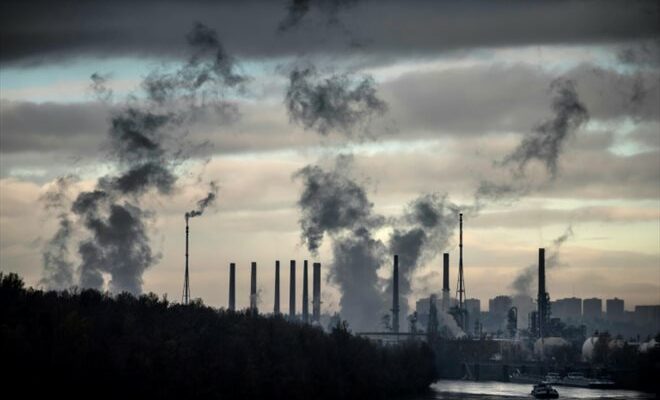The Total Donges refinery in Loire-Atlantique on June 22, 2017 (AFP/Archives/LOIC VENANCE)
One of the largest refineries in France shut down due to leaks, another victim of a fire, a falling demand for petroleum products: at a time of ecological transition, the climate is not looking good for employees of French oil platforms.
In February, the Donges refinery (Loire-Atlantique), the second largest in France, was shut down due to corrosion and leaks problems, before a full restart hoped for at the beginning of April.
“The tools are paying for the lack of sufficient maintenance for years and years,” complains Eric Sellini, CGT coordinator at the oil company TotalEnergies.
A complaint that the group’s management refutes: “We are not ignoring either safety or the necessary maintenance,” Jean-Marc Durand, director of refining and petrochemicals Europe, told AFP.
The half-dozen conventional refineries that remain in France represent between 5,000 and 10,000 direct jobs, according to Ufip, the union of oil companies.
TotalEnergies is not the only one to have experienced recent incidents: the Esso-ExxonMobil refinery in Port-Jérôme, near Le Havre, was the victim of a fire in a distillation unit on March 11, which caused five minor injuries. .
An incident that the group’s CGT does not link to a maintenance problem.
On the other hand, staff representatives deplore “industrial disinvestment”, says Germinal Lancelin, CGT delegate of the refinery.
– Competitiveness –
Representatives of the sector reject any claims of aging: “certain units date from a few decades ago, but every five to six years, we intervene to resolve the problems, so we cannot say that the stock is aging” , assures AFP the president of Ufip, Olivier Gantois.

The ExxonMobil site, in Port-Jérôme-sur-Seine in Seine-Maritime on October 12, 2022 (AFP/Archives/LOU BENOIST)
“What is certain is that it has been 50 years since we have built refineries in France, and we will not build new ones,” he adds, however.
An observation which can be explained by several factors. A competitiveness deficit, to begin with.
Refining must buy its energy to operate, particularly gas and electricity. However, “natural gas in France costs in a stable manner approximately twice as much as it cost before Covid. And before Covid, it already cost much more than what it costs in North America,” underlines Mr. Gantois.
“In Europe, energy is expensive, but to refine you need a lot of energy,” adds Mr. Durand, who nevertheless qualifies: “we do not sit idly by, we invest to reduce our energy consumption, we works every day to try to remain competitive.
Another stone in the sand, the decline in demand for petroleum products, with oil heating losing momentum and the gradual electrification of the automobile fleet.
At the Donges refinery, TotalEnergies will however invest 350 million euros in a new refining unit to produce fuels meeting European specifications, enough to challenge the idea of its disappearance in the medium term.
– Less need for staff –
But this is an exception, believes the group’s CGT: the time is more for the conversion of refineries into bio-refineries, which produce biomass-based fuels, as in La Mède (Bouches-du-Rhône) and Grandpuits (Seine-et-Marne), projects which resulted in restructuring.
These two sites have each gone from nearly 400 employees to around 250, according to management.

The Feyzin refinery south of Lyon, November 25, 2015 (AFP/Archives/Jean-Philippe KSIAZEK)
The CGT assures that a project of this type is in the pipeline for the Feyzin refinery, in the Rhône.
“We are constantly thinking about what we should do on each of our platforms,” replies Jean-Marc Durand.
“When we take the prospective scenarios of the International Energy Agency (IEA), even in the Net Zero Emissions scenario (at 2050) which is the most radical in terms of transformation and defossilization, the world still consumes oil and France too,” underlines Olivier Gantois.
“In 2050, in France, there will perhaps still be one, or even several, refineries processing oil,” he says. “But there will be others that no longer process it, and it is likely that those that still process oil will at that point process a mixture of oil and biomass.”
© 2024 AFP
Did you like this article ? Share it with your friends using the buttons below.




